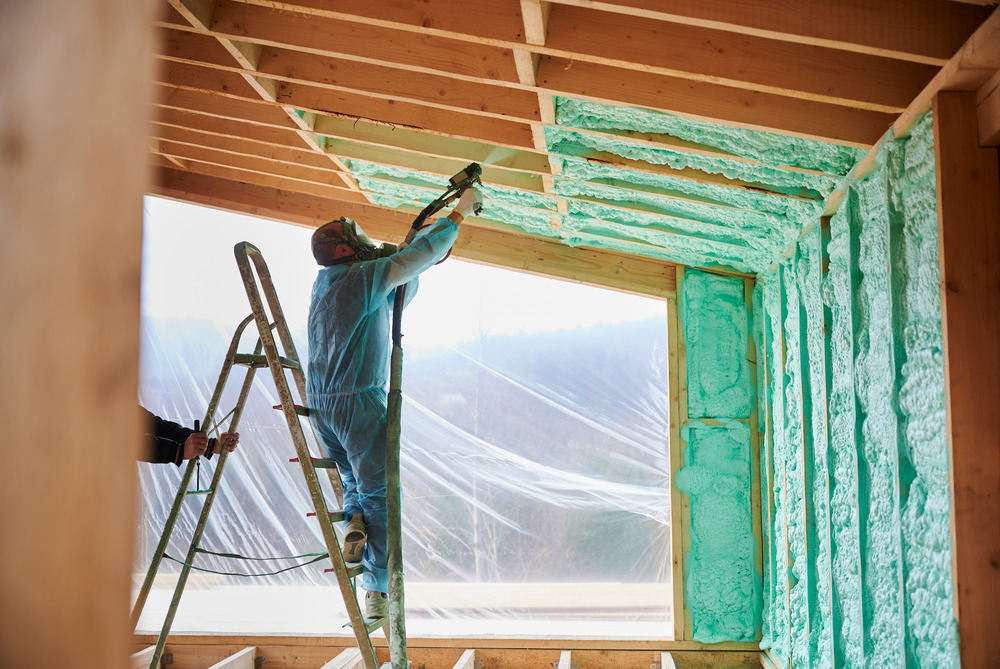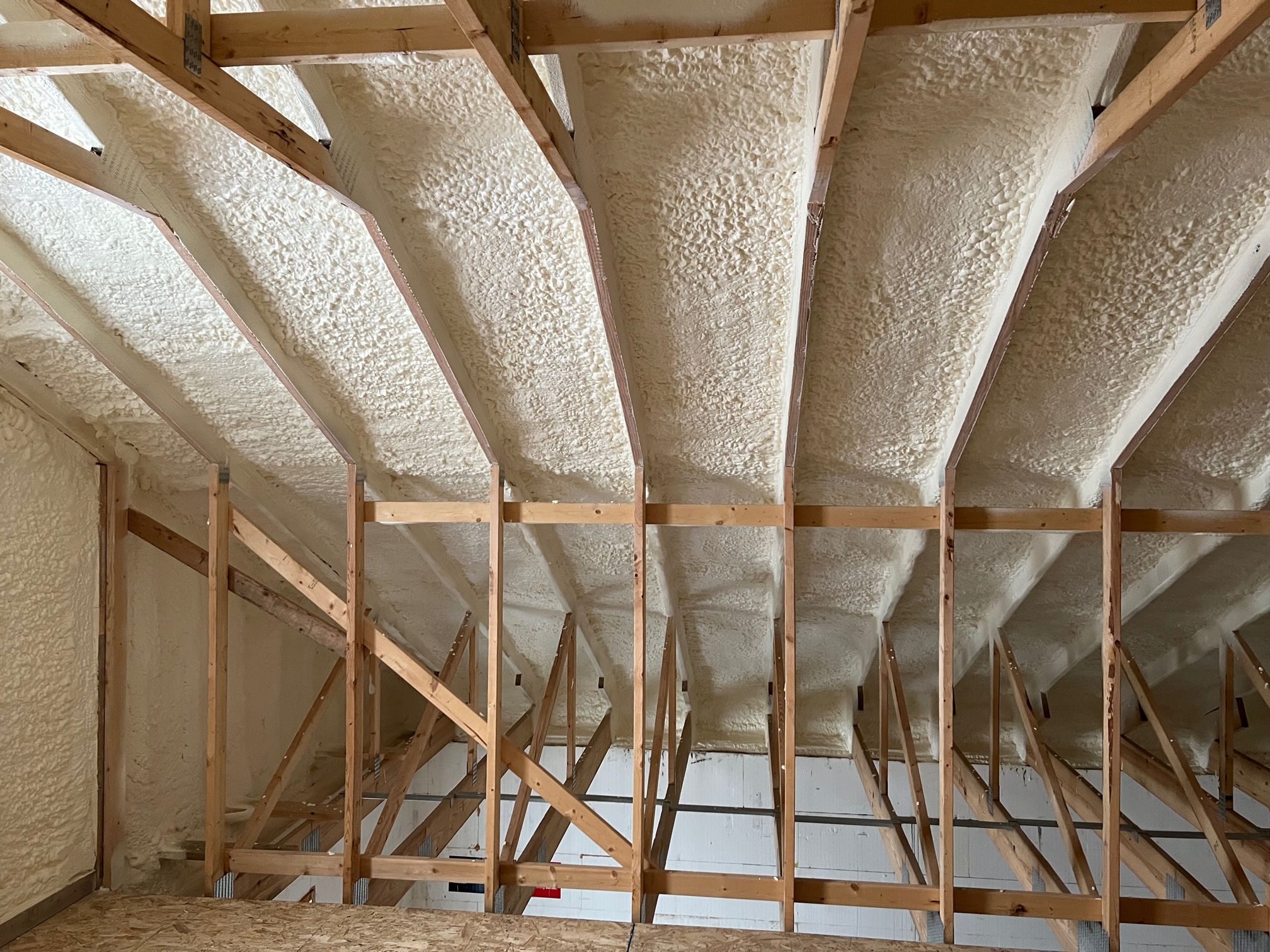How Spray Foam Can Boost Energy Performance in Any Type Of Building
Spray foam insulation has actually become a pivotal solution for boosting energy effectiveness across various structure kinds. By producing an impermeable seal that decreases air leak, it effectively regulates interior environments while substantially minimizing cooling and heating costs. Moreover, its remarkable R-value and moisture-resistant residential or commercial properties contribute to long-lasting energy cost savings and enhanced structure durability. As homeowner significantly seek sustainable options, the effects of spray foam insulation extend past simple utility savings. The complete range of its benefits, nevertheless, warrants a closer assessment of exactly how it can change power administration strategies in both domestic and industrial settings.
Recognizing Spray Foam Insulation
Spray foam insulation is significantly identified for its exceptional thermal performance and flexibility in numerous applications. Made up mostly of polyurethane, this insulation product is applied as a liquid that broadens upon call, loading spaces and creating a seamless barrier. This unique property enables spray foam to adapt uneven surface areas, making it an excellent option for both household and business frameworks.

Application of spray foam insulation is commonly executed by skilled specialists using customized devices, ensuring optimum performance and safety - Spray Foam. The curing procedure is fast, enabling for fast setup and marginal disturbance. Because of this, spray foam insulation is progressively being utilized in new building and retrofitting projects because of its capacity to improve structural integrity while improving overall energy effectiveness in structures
Benefits of Power Performance
Energy efficiency plays a critical duty in decreasing functional costs and minimizing ecological effect across different fields. By enhancing energy use, organizations and homeowners can accomplish substantial savings on utility expenses, which straight enhances monetary performance. Efficient power intake suggests less dependence on fossil fuels, thus contributing to a decrease in greenhouse gas emissions and advertising a more sustainable setting.
Moreover, energy-efficient buildings frequently experience increased building values. As power prices climb and sustainability becomes a priority for customers, residential or commercial properties with enhanced energy effectiveness attributes are a lot more appealing on the market. This trend encourages investment in energy-saving innovations, which can further drive development and financial development.
Along with monetary and environmental advantages, energy efficiency can also enhance the overall convenience and wellness of interior rooms. Proper insulation and reliable heating & cooling systems help preserve consistent temperatures, decreasing drafts and humidity levels, which in turn can cause much better interior air high quality.
Eventually, the advantages of power effectiveness prolong beyond prompt savings, fostering a durable economic situation, promoting environmental stewardship, and enhancing the lifestyle for passengers in any building.
Just How Spray Foam Works
Usually applied as a fluid, spray foam increases swiftly upon contact with surfaces, developing a strong barrier that successfully seals spaces and cracks. This distinct property results from its chemical make-up, primarily including isocyanates and polyols, which respond when mixed to develop a foam that fills spaces and sticks to different products, consisting of concrete, wood, and steel.
As soon as used, the foam increases to a number of times its original volume, guaranteeing a tight seal that prevents air leakage. This procedure significantly decreases thermal connecting, which happens when heat transfers with materials, resulting in energy loss. The foam's high R-value, a procedure of thermal resistance, adds to improved insulation by decreasing heat transfer between the interior and outside environments.
Furthermore, spray foam is resistant to moisture and bugs, even more enhancing its efficiency in preserving power efficiency. Its application can be customized to different locations, consisting of attics, walls, and crawl spaces, enhancing insulation throughout a structure. Spray Foam. Generally, the cutting-edge layout and application approach of spray foam make it an efficient remedy for enhancing power efficiency in any structure, causing reduced energy costs and a much more sustainable constructed environment

Applications in Different Structures
Numerous applications of spray foam insulation can be discovered across different building kinds, boosting power performance and comfort. In household homes, spray foam is typically utilized in attics and wall surfaces to create a smooth obstacle against air leaks, considerably minimizing home heating and cooling needs. This application is particularly useful in older homes, where traditional insulation might be insufficient.
In business buildings, spray foam insulation is applied to roofing system systems and outside walls, which helps to improve thermal performance and shield against moisture invasion. Its light-weight nature makes it a suitable option for retrofitting existing pop over to these guys structures without including considerable weight. Additionally, spray foam can be used in commercial settings to protect pipelines and tank, preserving temperature level control for sensitive materials.
Institutional buildings, such as colleges and health centers, benefit from spray foam insulation by guaranteeing a constant indoor climate that sustains owner convenience and wellness. The flexibility of spray foam allows it to adjust to various building shapes and sizes, making it a favored option for architects and home builders looking for efficient insulation services. Generally, spray foam insulation functions as a crucial component in achieving energy-efficient structures throughout all sectors.
Long-Term Cost Cost Savings
Spray foam insulation supplies substantial long-lasting expense financial savings for structure proprietors and occupants by decreasing energy consumption and lowering utility expenses. By providing a superior air seal, spray foam reduces the infiltration of outside air, thus enhancing the thermal performance of a building. This leads to extra efficient home heating and cooling down processes, which can cause significant decreases in energy costs with time.
Along with immediate cost savings on utility bills, the durability and longevity of spray foam insulation add to its financial advantages. Unlike typical insulation products, which might sag, settle, or degrade, spray foam keeps its performance for years, reducing the need for regular substitutes or repairs. This longevity translates to decrease maintenance prices and much less interruption for owners.
Furthermore, structures outfitted with spray foam insulation commonly take pleasure in a boost in property worth, making them much more review attractive to potential customers or occupants. As power efficiency comes to be increasingly prioritized, homes with effective insulation solutions attract attention out there. Eventually, the assimilation of spray foam insulation not only enhances comfort yet additionally represents a critical investment that generates significant financial advantages over the long-term.
Verdict
To conclude, spray foam insulation works as an important part in boosting energy efficiency across varied building kinds. Its capacity to create a smooth obstacle versus air leak, incorporated with moisture-resistant homes and high r-values, significantly lowers power usage and associated expenses. The implementation of spray foam not just adds to consistent interior temperature levels but also enhances home value, underscoring its function as a prudent financial investment for both household and industrial homes.
Spray foam insulation has emerged as a pivotal option for boosting energy performance across numerous structure types. Spray Foam. As a result, spray foam insulation is significantly being used in new building and construction and retrofitting tasks due to its capability to enhance structural integrity while enhancing overall power performance in structures
Overall, the cutting-edge design and application method of spray foam make it an efficient solution for enhancing energy performance in any type of structure, leading to lowered power expenses and an extra sustainable constructed atmosphere.
Many applications of spray foam insulation can be found throughout various building types, enhancing energy performance and convenience.In final thought, spray foam insulation go to this site offers as an important part in improving power effectiveness across diverse structure types.